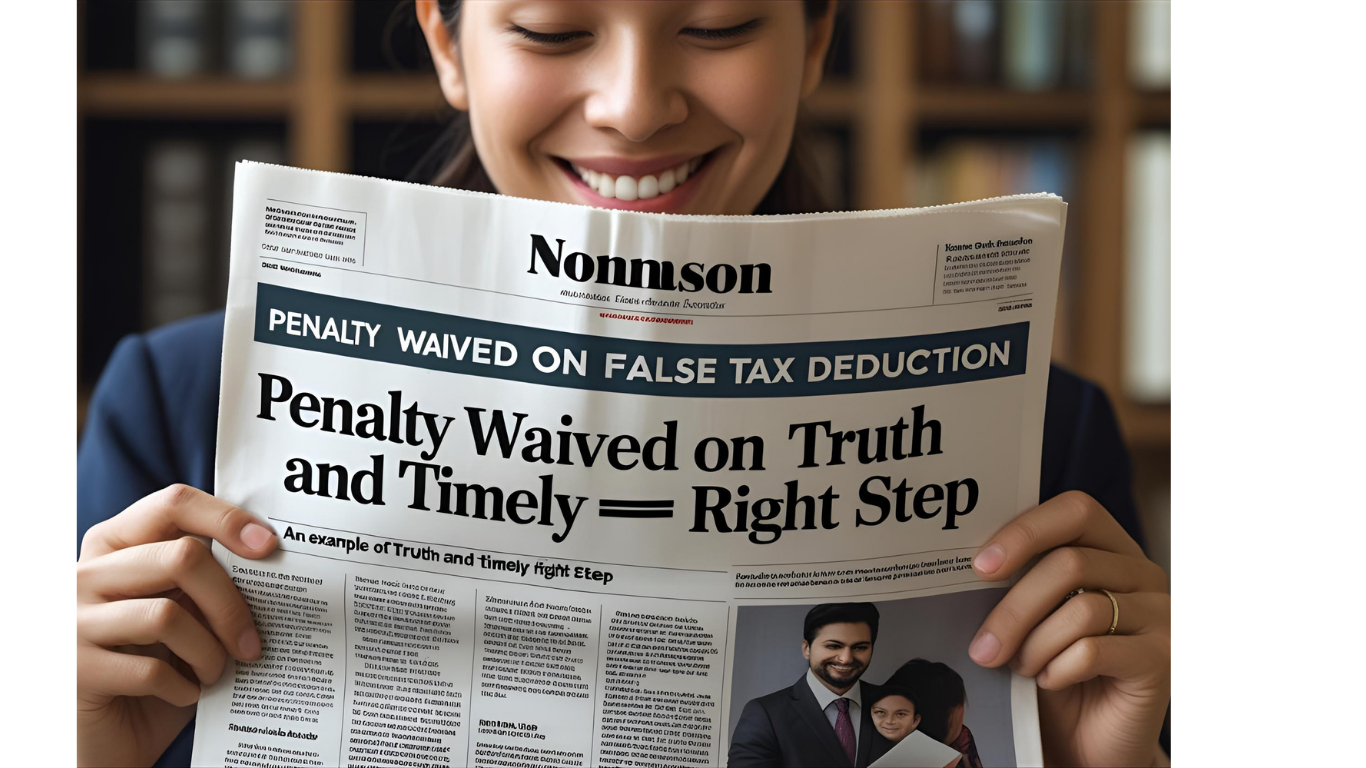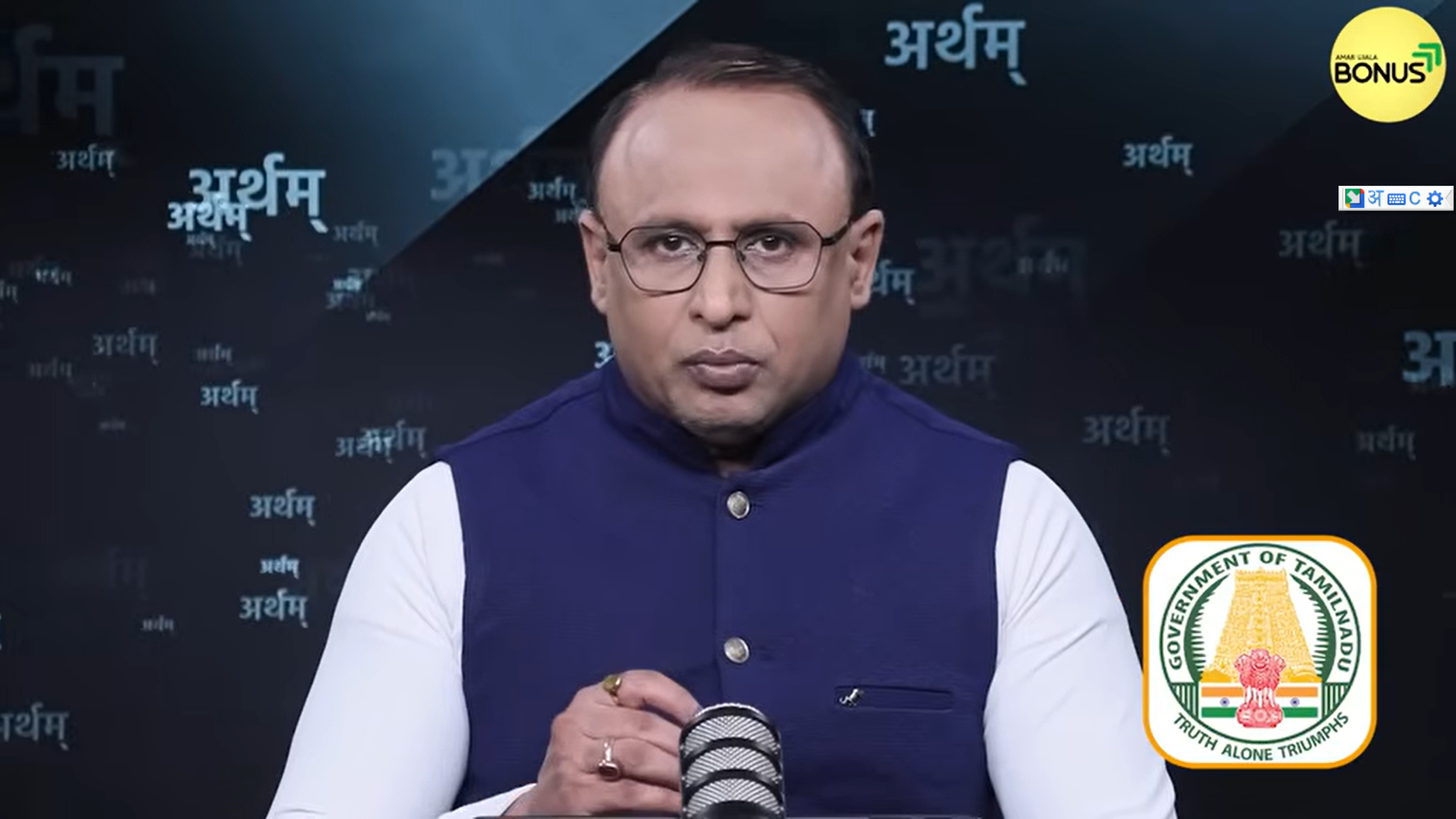
#IncomeTax #PenaltyCase #TaxLaw #India #ITAT #TaxDeduction #Finance #TaxpayerRights #LegalVictory #PersonalFinance
—- हिंदी आर्टिकल —-
परिचय
करदाता द्वारा claimed झूठे इनकम टैक्स डिडक्शन्स की वजह से लगाए गए 1.4 लाख रुपए के जुर्माने में हाई कोर्ट ने राहत दी। यह मामला उन लाखों सामान्य वेतनभोगियों के लिए एक बड़ा संदेश है, जो अपने टैक्स फाइलिंग के लिए कंसल्टेंट्स पर निर्भर रहते हैं। इस केस में सामने आया कि करदाता के साथ उसके टैक्स कंसल्टेंट ने धोखा किया, लेकिन जैसे ही गलती का पता चला, उसने पूरा बकाया टैक्स एवं ब्याज चुका दिया। इसके बाद भी आयकर विभाग ने भारी जुर्माना लगाया, लेकिन अंततः ट्रिब्यूनल ने करदाता की ईमानदारी और तत्परता के आधार पर सारे जुर्माने को ख़ारिज कर दिया।
केस की शुरुआत – क्या हुआ था?
-
वर्ष 2017-18: एक टेक्निकल बैकग्राउंड वाले कर्मचारी, श्री शिंदे की आय 8 लाख थी, लेकिन उनके टैक्स कंसल्टेंट पाटिल ने उनका टैक्सेबल इनकम केवल 4 लाख बताते हुए झूठे डिडक्शन्स का दावा कर दिया।
-
पाटिल ने कई कर्मचारियों की ITR फाइल कर, गलत डिडक्शन्स के आधार पर TDS रिफंड पाने की स्कीम चलाई।
-
मई 2019 में श्री शिंदे को जब असली कहानी पता चली, तो उन्होंने तुरंत बकाया टैक्स और ब्याज चुका दिया। उस वक्त तक संशोधित ITR फाइल करने की समयसीमा निकल चुकी थी।
जांच और कार्रवाई
-
फरवरी 2020: डिपार्टमेंट के इन्वेस्टिगेशन अधिकारी को पाटिल की धोखाधड़ी की जानकारी मिली। सेक्शन 147 के तहत कार्यवाही शुरू हुई और सेक्शन 148 के तहत नोटिस भेजा गया।
-
मार्च 2020: श्री शिंदे ने नोटिस का रिप्लाई देते हुए अपनी सही आय (8 लाख) की डिटेल दी।
-
सितंबर 2021: AO ने सेक्शन 270A(8) के तहत 1.4 लाख का पेनल्टी ऑर्डर पास किया – तर्क था कि शिंदे ने खुद से गलती न सुधारकर नोटिस के बाद ही सही इनकम दिखाई।
ट्रिब्यूनल में सुनवाई
-
श्री शिंदे ने CIT (Appeals) में पेनल्टी के खिलाफ अपील की, लेकिन यहां से भी राहत नहीं मिली।
-
आख़िरकार मामला ITAT पुणे गया।
-
ट्रिब्यूनल ने जांच में पाया कि पाटिल ने झूठे क्लेम कर सभी कर्मचारियों को धोखा दिया था और शिंदे जैसे कई कर्मचारी कंसल्टेंट पर पूरी तरह निर्भर थे।
-
शिंदे का तुरन्त टैक्स अदा करना, सही जानकारी देना और पुलिस में शिकायत दर्ज करवाना — सब उनकी भलाई और सत्यनिष्ठा का प्रमाण था।
ट्रिब्यूनल का फैसला
-
ITAT पुणे ने स्पष्ट कहा — “करदाता की सोच और स्वभाव में कोई दुर्भावना या टैक्स-चोरी का उद्देश्य नहीं था। उनके पास सही टैक्स नॉलेज नहीं थी और प्रोफेशनल (पाटिल) के धोखे के कारण यह गलती हुई। जैसे ही असली हालात पता चले, करदाता ने तत्काल खुद बकाया टैक्स एवं ब्याज जमा करवा दिया और विभाग से सम्पर्क किया।”
-
ट्रिब्यूनल ने AO के इस तर्क को खारिज किया कि संशोधित रिटर्न स्वयं से नहीं आया था और सारा फोकस करदाता की तत्परता और सतर्कता पर किया।
अन्य करदाताओं के लिए क्या सबक?
-
यह केस दिखाता है कि अगर गलत डिडक्शन या टैक्स रिटर्न में गलती हो गई हो और करदाता उसे समय रहते खुद से पूरा टैक्स एवं ब्याज जमा कर देता है, तो विभाग पेनल्टी माफ कर सकता है।
-
कोर्ट ने कहा — “सिर्फ गलत क्लेम होने से हर मामले में पेनल्टी जरूरी नहीं। अगर करदाता की नीयत साफ़ हो और प्रोफेशनल की गलती साबित हो, साथ ही स्वेच्छा से कर चुका दिया जाए, तो राहत मिलनी चाहिए।”
धोखा पकड़ाने का तरीका और आगे की कार्रवाई
-
टैक्स कंसल्टेंट के यहाँ सर्वे (सेक्शन 133A) हुआ और वहां से गुल खिली कहानी सामने आई। दर्जनों कंपनियों के कर्मचारियों के नाम झूठे रिफंड क्लेम में पाये गए।
-
धोखा पकड़े जाने पर बड़ी संख्या में लोगों ने आर्थिक अपराध शाखा में शिकायत दी।
-
आईटीएटी में फैसले के बाद विभागीय आदेश था – पेनल्टी पूरी तरह माफ व AO को निर्देश जुर्माना हटाने के लिए।
टैक्सपेयर के लिए चेतावनी और सलाह
-
फाइलिंग करते समय हर डिटेल, कटौती या डिडक्शन खुद समझे, कभी केवल कंसल्टेंट पर निर्भर न रहें।
-
अगर गलती हो जाए, तो खुद आगे आकर पूरा टैक्स, ब्याज जमा करें — इससे पेनल्टी या कानूनी कार्यवाही से बचाव हो सकता है।
-
टैक्स डिपार्टमेंट अब गलत डिडक्शन पर सख्त है, लेकिन इस फैसले के ज़रिये ईमानदार और जागरूक टैक्सपेयर्स को राहत का रास्ता खुला है।
कानून और सेक्शन – आम जानकारी
-
आयकर अधिनियम की धारा 270A(1)/(8): गलत या झूठी कटौती पर टैक्स के 50% (गलती) या 200% (इच्छापूर्वक धोखा) तक पेनल्टी हो सकती है।
-
अगर आयकर दाता दोषी पाये गए तो जेल भी हो सकती है (धारा 276C) — जानबूझ कर टैक्स चोरी में कड़ी सज़ा और अर्थदंड दोनो।
निष्कर्ष
अंततः, यह मामला लाखों वेतनभोगी कर्मचारियों को यह सिखाता है कि ईमानदारी, सतर्कता एवं समय रहते सही निर्णय हर जुर्माना, परेशानी और कोर्ट केस से छुटकारा दिला सकता है। अगर आपने अनजाने में गलती की है, तो समय रहते खुद सुधारना सबसे सुरक्षित और व्यवहारिक उपाय है।
—- English Article —-
Introduction
In an important ruling, a taxpayer who was served a Rs1.4 lakh penalty for claiming false income tax deductions—effectively cutting his reported income by 50%—has received complete relief from the Income Tax Appellate Tribunal (ITAT), Pune. This landmark case sets an essential precedent for millions of salaried individuals in India who rely on tax consultants but may not fully grasp the intricacies of tax law.
Background: How the Case Began
-
Financial Year 2017-18: Mr. Shinde, working in a technical role, had a gross salary of Rs8 lakh. However, his tax consultant, Mr. Patil, filed his tax return showing only Rs4 lakh taxable income by using several bogus deductions.
-
Patil, who handled returns of many employees in prominent companies such as Ceat, Bosch, HAL, and Mahindra & Mahindra, presented himself as an expert who could ensure higher refunds through clever paperwork.
-
On May 28, 2019, Shinde discovered the fraud after conversing with co-workers. Realizing this, he paid the full outstanding tax along with interest. However, since the deadline for filing a revised return had passed, he could not rectify the return voluntarily via the usual process.
The Investigation & Departmental Actions
-
February 2020: Upon receiving information from the investigation wing regarding excess deduction claims, the Assessing Officer (AO) initiated proceedings against Shinde under Section 147 of the Income Tax Act and sent a notice under Section 148.
-
March 2020: In response, Shinde submitted a fresh return, declaring his actual taxable income of Rs8 lakh.
-
March 2021: The AO completed assessment under Section 147, accepting the corrected filing and closing the matter.
-
September 2021: Despite the voluntary correction, the AO imposed a penalty of Rs1,46,760 under Section 270A(8), citing misreporting and under-reporting of income.
The Appeals Process
-
Shinde first appealed with the Commissioner of Income Tax (Appeals), arguing his innocence and good faith, but the penalty was upheld.
-
He then escalated the case to the ITAT, Pune.
-
The tribunal’s investigation established that Patil had engineered a large-scale scam, duping not only Shinde but scores of other salaried employees as well.
Key Tribunal Observations
-
The ITAT found that Shinde, and others, did not intentionally conceal income or evade tax. Instead, they relied in good faith upon their tax consultant and remained unaware of the fraudulent deductions.
-
As soon as Shinde became aware (via colleagues and later through an official survey at Patil’s premises), he paid the due tax with interest—this proactiveness occurring months before the official Section 148 notice.
-
The tribunal further noted Shinde’s police complaint with the Economic Offences Wing against Patil, underlining his bona fide intentions and commitment to corrective action.
Legal Analysis
-
Under Section 270A, penalties up to 50% of unpaid tax can be levied for under-reporting of income, and up to 200% in cases of willful misreporting.
-
In this case, the penalty represented about 17% of Shinde’s actual annual salary.
-
The AO argued that since Shinde did not voluntarily revise his ITR and disclosed the correct amount only post notice, the penalty was justified.
The Verdict
-
The ITAT categorically rejected this argument, stating that Shinde’s approach was timely and transparent, and that the inability to file a revised return was solely due to statutory deadlines, not a lack of intent.
-
The tribunal recognized the bona fide reliance on a consultant due to lack of personal tax law knowledge, and the immediate payment of dues prior to any official departmental demand.
-
“The penalty is not warranted as the taxpayer acted with honesty and promptness, had no motive of evasion, and corrected the error at the earliest opportunity,” the tribunal ruled.
-
The entire penalty was thus canceled, and the AO was directed to remove it from Shinde’s records.
Lessons for Other Taxpayers
-
If you discover a tax mistake—not of your own design—and take immediate corrective steps, including paying back taxes and interest before a formal demand is raised, you stand a strong chance of being spared a penalty.
-
The judgment emphasizes that not every improper deduction or error is a cause for punishment; instead, the taxpayer’s intent, knowledge, and response play a major role.
-
Courts and tribunals may grant relief when taxpayers can prove they were unaware, acted in good faith, and promptly made amends.
Caution and Proactive Habits
-
Always check your tax return—whether filed yourself or via a consultant. Every deduction must be legitimate, and blind faith in professionals is risky.
-
If you receive information of errors or suspicious deductions, act fast: consult a trusted tax professional, pay any due taxes, and maintain all records of correspondence and transactions.
-
Filing a police complaint in fraud cases, as Shinde did, not only strengthens your position but shows seriousness and transparency.
Legal Sections & Ramifications
-
Section 270A: Penalties for under-reporting (50%) and misreporting (200%) of income.
-
Section 276C: Prosecution and jail in extreme and willful tax evasion cases.
-
Judges emphasized: Voluntary, honest correction—especially before statutory notice—can be a strong shield against penalty or prosecution, provided supporting evidence is thorough.
Broader Implications
-
With increased government focus on detecting bogus deductions using advanced analytics, salaried taxpayers must be alert.
-
This case acts as a precedent for honest mistake correction and the principle of ‘no penalty without intent to deceive.’
-
Genuine taxpayers, especially those unfamiliar with tax details, find assurance: fast and honest remediation counts for much more than rigid technical defaults.
Conclusion
This case is a beacon for India’s salaried class: even a serious error—like halving your reported income via bogus deductions—need not result in harsh penalties if you act in good faith, take responsibility, and immediately make all tax payments upon discovering the oversight. Transparency, timeliness, and maintaining a record of communications—including complaints if a tax professional defrauds you—are your greatest safeguards in the Indian tax system today.







